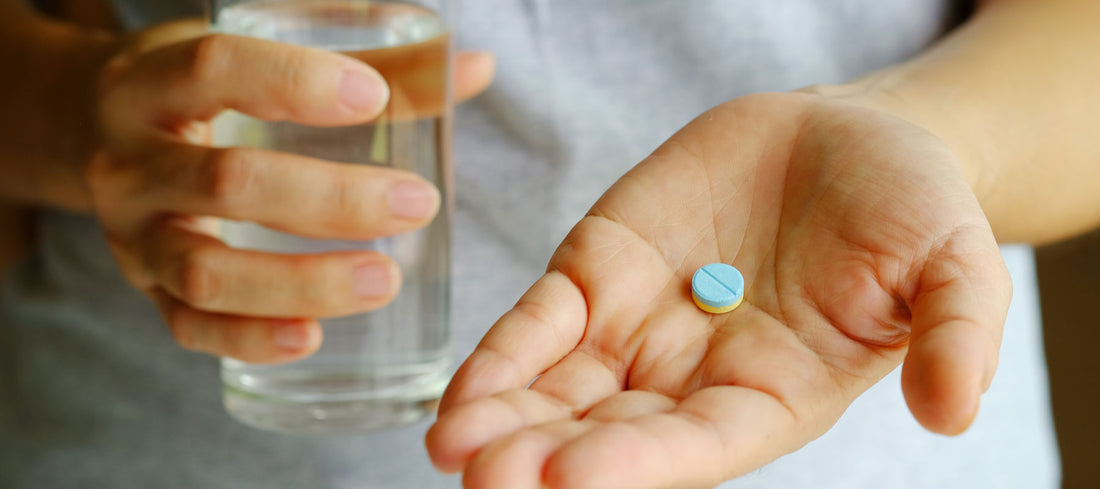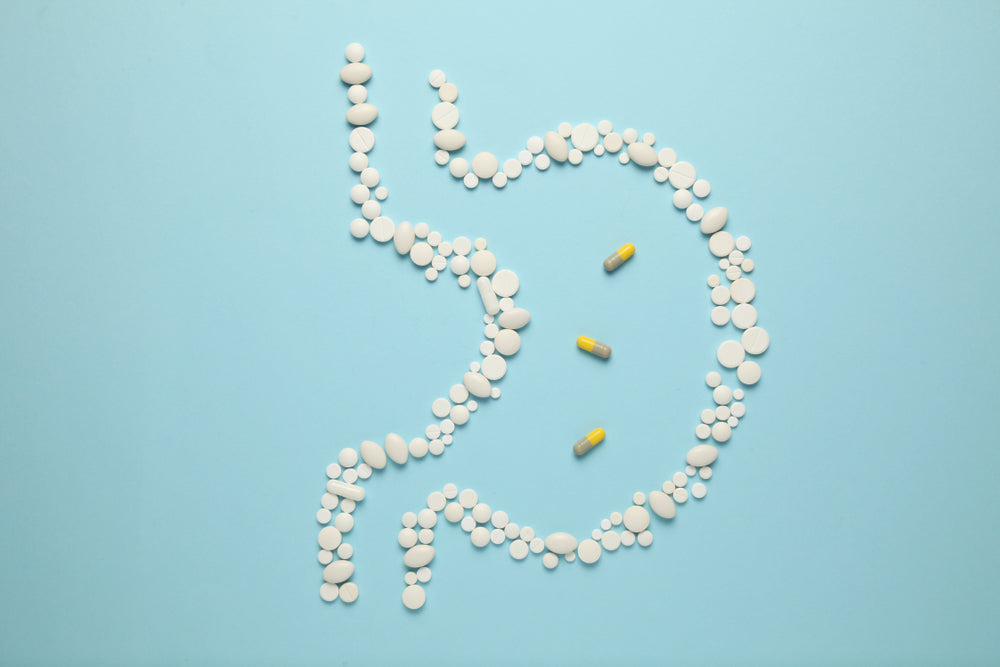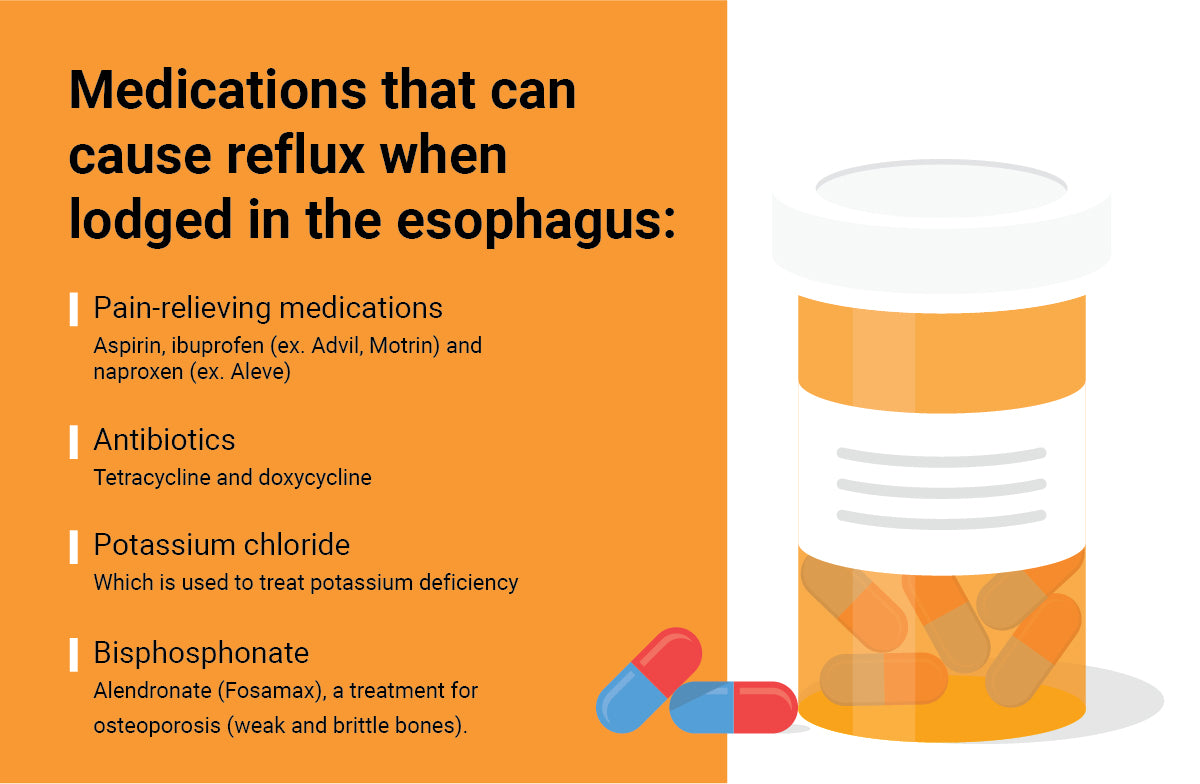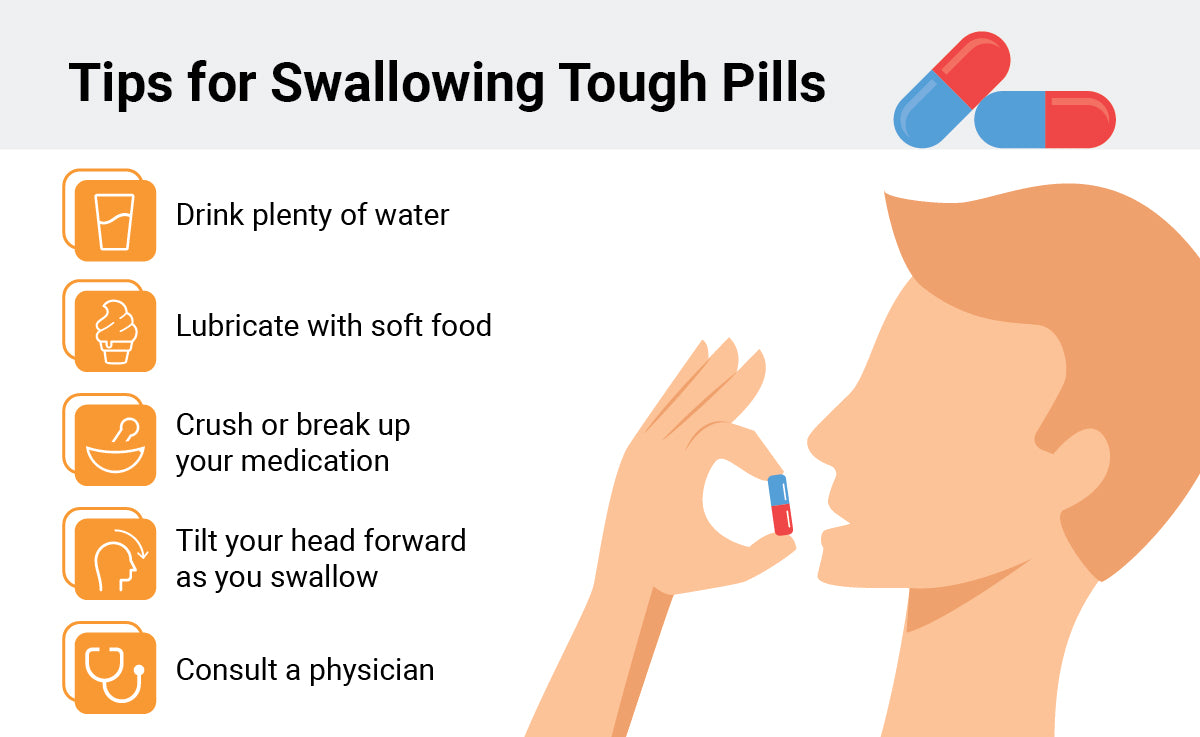
Related Product

Reflux Relief System
$249.99 USD
Say goodbye to nighttime Acid Reflux & GERD pain without sacrificing comfort.
Medications That Cause Acid Reflux Symptoms When Stuck in Throat
Share
One of the first steps in treating acid reflux/GERD (Gastroesophageal Reflux Disease) is to know what’s triggering your symptoms. Food triggers vary but certain foods, such as tomatoes and onions, and beverages like coffee and alcohol are known to trigger symptoms.
But another possible trigger may also be lurking in your medicine cabinet. While non-chewable pills are meant to pass through your esophagus into your stomach or intestines before dissolving, sometimes these pills can get caught in your esophagus and cause acid reflux flare-ups.
If you’ve ever felt like a pill was stuck in your throat, read on to learn which medications could irritate your acid reflux and what you can do to minimize your symptoms. You may even be wondering since they’re so small, can pills get stuck in your throat? Use the links below to skip to the section that best answers your query, or read through for a comprehensive overview of the topic.
- What Happens When a Pill Gets Stuck in Your Throat?
- Which Pills Can Cause Acid Reflux Symptoms?
- How to Avoid Getting a Pill Stuck in Your Throat
- Other Tips for Managing Acid Reflux
- MedCline Acid Reflux Relief Systems
What Happens When a Pill Gets Stuck in Your Throat?
When a pill is stuck in your throat, it can break down and release the medication causing damage to your esophagus. Tablets can also get lodged in the Lower Esophageal Sphincter (LES), a small valve above your stomach. In both cases, these medications can cause reflux symptoms when not properly ingested.
Over time, repeated esophageal exposure to medications can lead to GERD, esophagitis, and other serious diseases. In some cases, the harmful effects are worse than the ailment that prompted the medication.
Why Do Pills Get Stuck?
When you swallow food, water, or medication, the particles have to travel through your esophagus and eventually land in your stomach, but sometimes, objects, like pills, get stuck at the top of the esophagus at a ring-like muscle called the cricopharyngeus. It helps control which objects can pass through, and if the cricopharyngeus does not relax as you swallow, your pill might get stuck.
To avoid that uncomfortable pill-stuck-in-your-throat feeling, and resulting reflux symptoms, you’ll want to ensure that your medication passes through your throat as smoothly as possible. We’ll discuss some pill-swallowing techniques to help you avoid inducing reflux a little later in this post.

What Is Pill Esophagitis?
Pill esophagitis is pain in your throat and chest caused by swallowing medications. It can also feel like a pill stuck in the chest or the throat, or a pill-stuck-in-the-throat feeling that won’t go away. Certain medications, like antibiotics and anti-inflammatory drugs, can irritate and injure the lining of your esophagus, causing pain and heartburn.
Esophagitis is usually caused by the effects of stomach acid washing back into the esophagus, but pill esophagitis isn’t caused by stomach acid — it’s caused by the medications that change the environment of the esophagus.
How Long Does Pill Esophagitis Last?
Pill esophagitis can last for as long as you take the offending medication and for a while once you stop. You may also be wondering how long the heartburn that comes with it lasts. How quickly your symptoms resolve depends upon the amount of damage done to your esophagus.
Your doctor may prescribe things like antacids, numbing spray and medication to coat the lining of your throat to help it heal.
Common Symptoms When a Pill Gets Stuck in Throat
The symptoms of getting a pill stuck in your throat can resemble those of acid reflux and can include:
- Burning sensation in your chest
- Esophagus burning sensation
- Burping
- Pain when swallowing
- Gagging
- Pain in the neck, chest or abdomen
- Feeling that something is stuck in your throat
Which Pills Can Cause Acid Reflux Symptoms?
What is acid reflux? Acid reflux occurs when the acid in your stomach refluxes into your esophagus. This can cause a burning sensation, esophagus burning, belching, and if severe enough, painful swallowing.
Dull, aching pain in the chest or shoulder after taking medication is a warning sign that a pill may be lodged in your esophagus. You may also experience painful swallowing or difficulty swallowing if you try to relieve these symptoms. Having a pill stuck in your throat is uncomfortable as is, but certain medications manifest more irritating effects, such as acid reflux, when they break down in your esophagus.

The types of drugs that can cause reflux and other problems when lodged in the esophagus include:
- Pain-relieving medications: Including aspirin, ibuprofen (ex. Advil, Motrin) and naproxen (ex. Aleve)
- Antibiotics: Including tetracycline and doxycycline
- Potassium chloride: Used to treat potassium deficiency
- Bisphosphonates: Including alendronate (Fosamax), a treatment for osteoporosis (weak and brittle bones)
Which Pills Can Cause Acid Reflux Symptoms?
Nonsteroidal Anti-inflammatory Drugs (NSAIDs)
NSAIDs are common pain relievers that are either over-the-counter or prescription. They are used to treat inflammation, pain and fever. Though they’re commonly used, they also come with a list of side effects, including acid reflux. NSAIDs can cause heartburn because they can irritate the esophagus and/or lining of the stomach. In fact, if you use NSAIDs for an extended period of time, you could be at risk of developing stomach ulcers.
Taking NSAIDs with food, not exceeding the daily recommendations, and using heartburn medications, may help limit the amount of irritation.
Examples of NSAIDs include:
- Aspirin
- Ibuprofen (ex. Advil, Motrin)
- Naproxen (ex. Aleve)
- Celebrex
Antibiotics
Like NSAIDs, antibiotics can cause heartburn because they irritate the lining of the stomach. Antibiotics can also kill the good bacteria in your gut, which may cause digestive distress like heartburn.
Potassium Chloride
Potassium chloride is used to treat symptoms of low potassium levels. Side effects of potassium chloride include stomach upset and heartburn.
Bisphosphonates
Bisphosphonates are used in the treatment of bone loss. Like the previous medications listed, bisphosphonates can cause heartburn because they irritate the stomach lining and lining of the esophagus.
Examples of bisphosphonates include:
- Alendronate (Fosamax)
- Risedronate
- Ibandronate
Antidepressants
A class of antidepressants known as tricyclic antidepressants can cause acid reflux by weakening the esophageal sphincter that’s responsible for keeping stomach acid inside your stomach. Additionally, tricyclic antidepressants and another form of antidepressant known as SSRIs may contribute to acid reflux because they slow down the digestive tract, making it easier for stomach contents to reflux.
Examples of tricyclic antidepressants include: Amitriptyline, nortriptyline, imipramine
Calcium Channel Blockers
Calcium channel blockers are used to treat high blood pressure and heart conditions. They can cause acid reflux because they relax the sphincter at the top of the stomach which keeps stomach contents inside.
Examples of calcium channel blockers include:
- Amlodipine
- Diltiazem
- Verapamil
Progestin
Progestin is a synthetic form of progesterone, a hormone produced in the body. It’s used to treat several hormonal-related issues, including regulating periods and treating menopausal symptoms. Progestin can cause heartburn symptoms by relaxing the lower esophageal sphincter, allowing more acid or stomach contents to reflux into the esophagus.
What to do if medication causes acid reflux symptoms
While food-related triggers can be avoided, taking medication may be essential to treat a disease, relieve pain, or fight off an infection. It is important to understand how to reduce the risks of drug-induced GERD and other esophageal damage.
If your medication is causing acid reflux symptoms, talk to your doctor to see if there are any alternative treatment methods you can employ. Additionally, whether you’re taking acid reflux medication, aspirin, ibuprofen, or some other irritating medicine, it’s important to make sure that you’re following proper precautions when administering your medication. To help you minimize the potential for acid reflux irritation when taking your medication, we’ve outlined some tips below.
How to Minimize Acid Reflux Symptoms While on Medications
1. Talk to Your Doctor
If you’re experiencing acid reflux symptoms and you think they could be from your medication, speak with your doctor. Your doctor may change medications or advise you on how you can limit symptoms while taking the medication.
2. Take Medications with Food
Taking your medications with food can be helpful if the medication you use causes irritation to the stomach lining. Having food in your stomach before or when you take your medication can help provide a buffer between the medication and your stomach lining.
3. Avoid Trigger Foods
Avoiding trigger foods like onion, garlic, fatty foods, mint or alcohol can help lessen your symptoms. These foods can cause or worsen acid reflux symptoms because they either relax the lower esophageal sphincter, allowing stomach contents to more easily reflux or are slow to digest, making it more likely that they could reflux.
4. Elevate Your Head While Sleeping
If you suffer from acid reflux at night, elevating the head of your bed by 6 to 8 inches can help relieve symptoms. The slight elevation uses gravity to help keep your stomach contents where they belong. If you can’t elevate the head of your bed, you can try using an acid reflux wedge pillow, which provides the same kind of elevation.
5. Maintain a Healthy Weight
Excess weight, especially around your midsection, can put pressure on your stomach, causing your lower esophageal sphincter to weaken and your stomach contents to be more easily refluxed. Maintaining a healthy weight, or losing excess weight, can help relieve some of this pressure and your symptoms.
6. Don't Lie Down After Eating
If you have reflux symptoms, don’t lie down after you eat because the gravity that was helping to keep your stomach contents where they belong is no longer on your side. Try to aim for at least three hours from your last meal before you lay down.

How to Avoid Getting a Pill Stuck in Your Throat
When a pill gets stuck in your throat, it deteriorates and releases the medication over time, potentially causing reflux flare-ups and ultimately, damage to your esophagus. To avoid this scenario or getting a pill stuck in your windpipe, it’s important to take precautions when consuming any medication orally.
Here are some tips to help a capsule pass through the esophagus quickly and into the stomach:
- Take several sips of water to wet the throat before taking a tablet or capsule.
- Swallow the pill with at least 8 ounces of fluid.
- Lubricate With Soft Food
- Ex. applesauce and yogurt
- Crush or Break Up the Pill
- Taking the medication in smaller segments can make it easier to swallow; just consult your doctor before doing so.
- Adjust Your Position
- Take medication while in an upright or sitting position.
- Stay upright for at least 15 minutes after taking a pill.
- Consult Your Physician
- If these tips don’t work, your doctor may be able to recommend a medication that’s easier to swallow.

Common Mistakes When Taking Medication
It might seem that there isn’t a wrong way to take medication, but if you’re suffering from pill esophagitis or your medication is causing acid reflux symptoms, there are some common medication-taking mistakes that can make you feel worse.
Mistake #1: Taking meds at the wrong time of day
If you have acid reflux symptoms, the time of day you take your pill can make all the difference. You may find that taking it in the morning or afternoon when you have more food in your stomach and are upright helps to lessen your symptoms. If you have questions about the best time of day to take your medication, speak with your doctor.
Mistake #2: Not drinking enough water after swallowing a pill
A common cause of pill esophagitis is not drinking enough water when you swallow a pill. This is because remnants of the pill can get stuck in your throat causing irritation. According to the National Poison Control Center, pills that are oval, have a gelatin coating on the outside, or are oblong are the most difficult to swallow.
To prevent pill esophagitis or throat irritation, make sure you take your medication with at least 8 ounces of water and do so while sitting up.
Mistake #3: Taking the medication with the wrong food
If you have acid reflux symptoms, taking your medication with a food that causes or worsens acid reflux can make your symptoms worse. In addition, some foods don’t react well with certain medications. If you have questions about what foods to take with your pills, ask your doctor.
Mistake #4: Taking medication while lying down
Taking your pill while lying down, even if you drink plenty of water, can increase your risk of throat irritation and pill esophagitis. To reduce this risk, always sit up when you take your medication.
Mistake #5: Lying down immediately afterward
Like lying down after you eat, lying down after you take your medication can cause or worsen reflux symptoms because gravity isn’t working for you in the way it would if you were upright.
Note: If swallowing is painful or if the tablets or capsules get stuck in your throat, you should contact your doctor. Trouble swallowing could signal a more serious condition.
While medication can be an important part of managing disease, it can also trigger acid reflux and lead to GERD and other conditions. By taking your pills with care, you can limit your risk of drug-induced complications from obstruction of the esophagus. And, when possible, supplement or replace medications with preventative treatments that don’t have unwanted side effects (always consult with your doctor first before changing a drug regimen).
What should I do if a pill gets stuck in my throat?
When a pill gets stuck in your throat, it can cause damage to your esophagus, including inflammation, acid reflux flare-ups, and potentially pill-induced esophagitis. With that said, if a pill gets stuck in your throat, you should never leave it to dissolve but rather wash it down with food or water. You can also try lying down as you swallow the water to encourage your throat to relax and dislodge the pill.
Other Tips for Managing Acid Reflux
In addition to abiding by these recommended pill-ingesting techniques, keep these tips for managing acid reflux in mind:
- Avoid your trigger foods: Citrus fruits, tomato-based products, as well as fried and spicy foods are common culprits of reflux flare-ups.
- Integrate GERD-friendly foods into your diet: High-fiber, alkaline-rich, and watery foods such as cucumber and watermelon are known to prevent acid reflux symptoms.
- Change up your mealtime habits: Try to eat smaller meals throughout the day and avoid eating right before bedtime to prevent nighttime reflux.
- Adjust your sleeping posture: By sleeping at an incline, or better yet, on your left side and at an incline, you can minimize uncomfortable reflux symptoms while you sleep.
Keep these best practices and use our tips to prevent pills from getting stuck in your throat, and you’ll find the relief you’ve been searching for in no time.
MedCline Acid Reflux Relief Systems
Some of our customers have offered feedback, including comments about their personal experience with reducing or eliminating the need for acid reflux medications when using the MedCline Reflux Relief System. We hope to continue to help others find acid reflux relief outside of the medicine cabinet.
Our patented three-component Reflux Relief Sleep System is the only product on the market today that achieves the doctor-recommended inclined, left-side sleeping position in one simple solution for effective, natural acid reflux symptom relief.
Clinical studies show significant improvement for:
- Gastroesophageal Reflux Disease (GERD) // Acid Reflux
- Laryngopharyngeal Reflux (LPR) // Silent Reflux
- Gestational Reflux
[featured-product]
Frequently Asked Questions (FAQs)
Can pills get stuck in your throat?
Whether pills get stuck in your throat depends on several factors:
- The size and shape of your pill
- If you have any swallowing difficulties
- And whether you take your pill with an adequate amount (at least 4 ounces) of water
How long can a pill be stuck in your throat?
How long a pill stays stuck in your throat depends on a few things:
- The size and shape of the pill. Larger pills can stay stuck longer as they take longer to dissolve.
- How well and quickly you’re able to swallow. If you have swallowing difficulties, it may take longer for the movements of your esophagus to push the pill down.
- The anatomy of your throat. If you have any abnormalities of the throat that would cause something to get lodged inside, it may take longer for a pill to move.
In most cases, pills become unstuck within a few hours. If you have a pill that is stuck and you are concerned or experiencing pain, seek medical treatment right away.
Why do I feel like a pill is still stuck in my throat?
If it feels like a pill is stuck in your throat, don’t panic. You may have swallowed the pill but still feel like it’s stuck because your throat muscles are spasming. If you experience spasms of your throat muscles, it can affect your swallowing, causing food or medication to become stuck in your throat or to be regurgitated.
Esophageal spasms can happen if you swallow large pills, swallow a pill without enough liquid, or have pre-existing conditions that cause them. The key thing to note is with esophageal spasms, the discomfort will eventually lessen as your throat relaxes, but if you’ve got a pill stuck in your throat, you’ll likely experience symptoms like trouble swallowing, pain and chest pain.
Can a stuck pill damage your throat?
A stuck pill can damage your throat because, as the tablet dissolves, the medication inside can irritate the lining of the esophagus.
Can a stuck pill damage your esophagus?
A stuck pill can damage your throat because, as the pill dissolves, the medication inside can irritate the lining of the esophagus.
What happens in a pill dissolved in your throat?
If a pill is dissolved in your throat, it can cause pain and irritation to the throat lining and pain. If the pill contents stay in contact with your throat for a long period, ulcers may form in your esophagus. When a pill dissolves in your throat, you may experience symptoms like pain, difficulty swallowing, the feeling that something is stuck in your throat, or chest pain.
References:
Related Product

Reflux Relief System
$249.99 USD
Say goodbye to nighttime Acid Reflux & GERD pain without sacrificing comfort.
